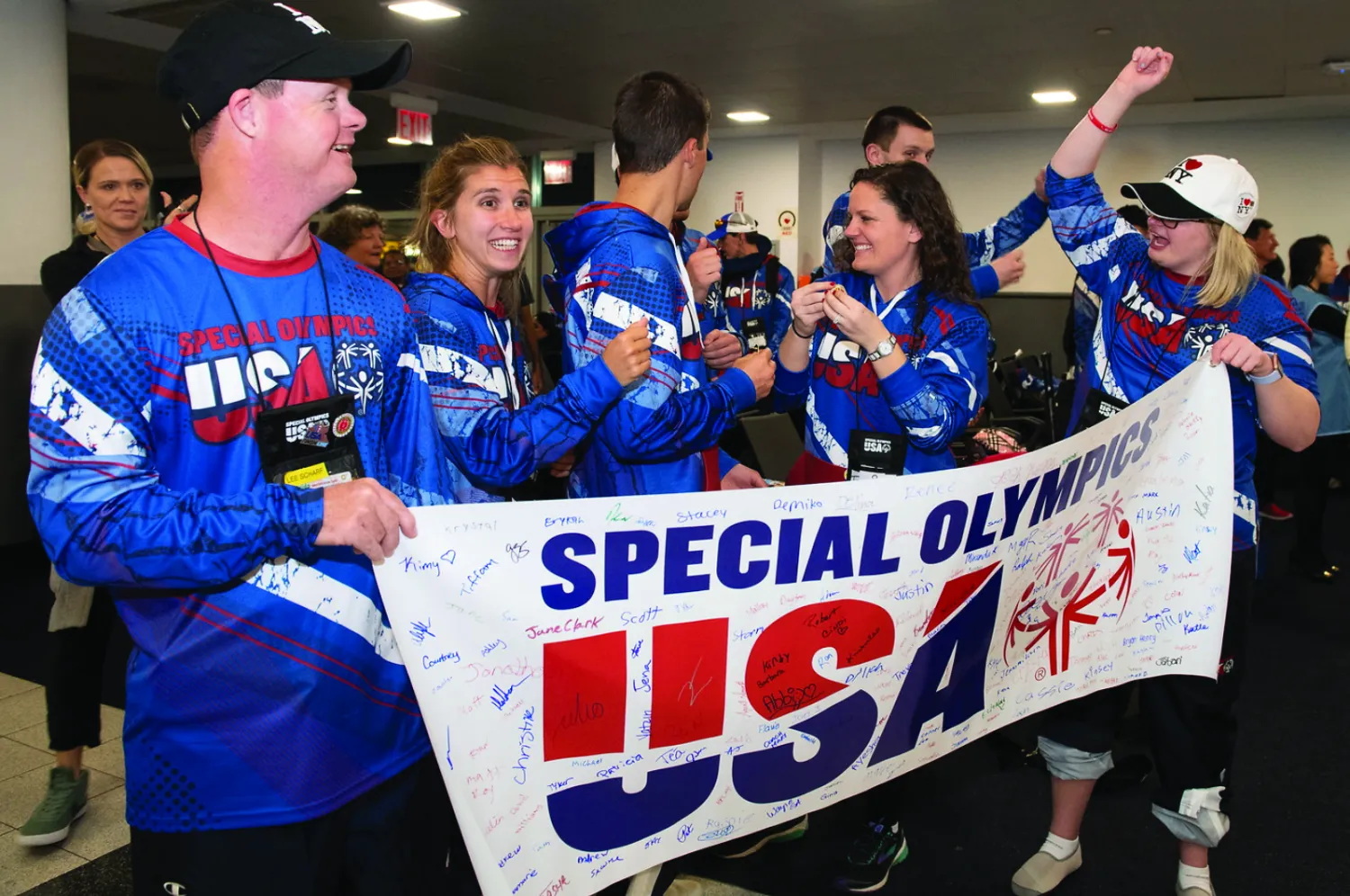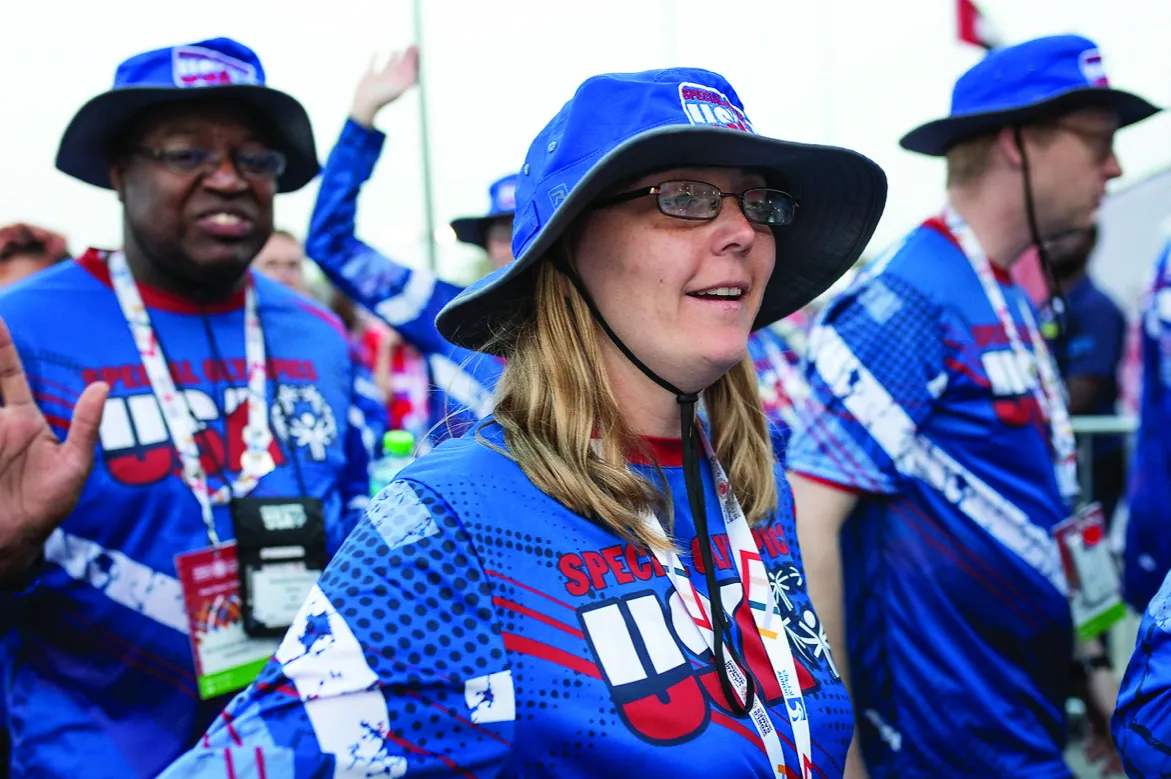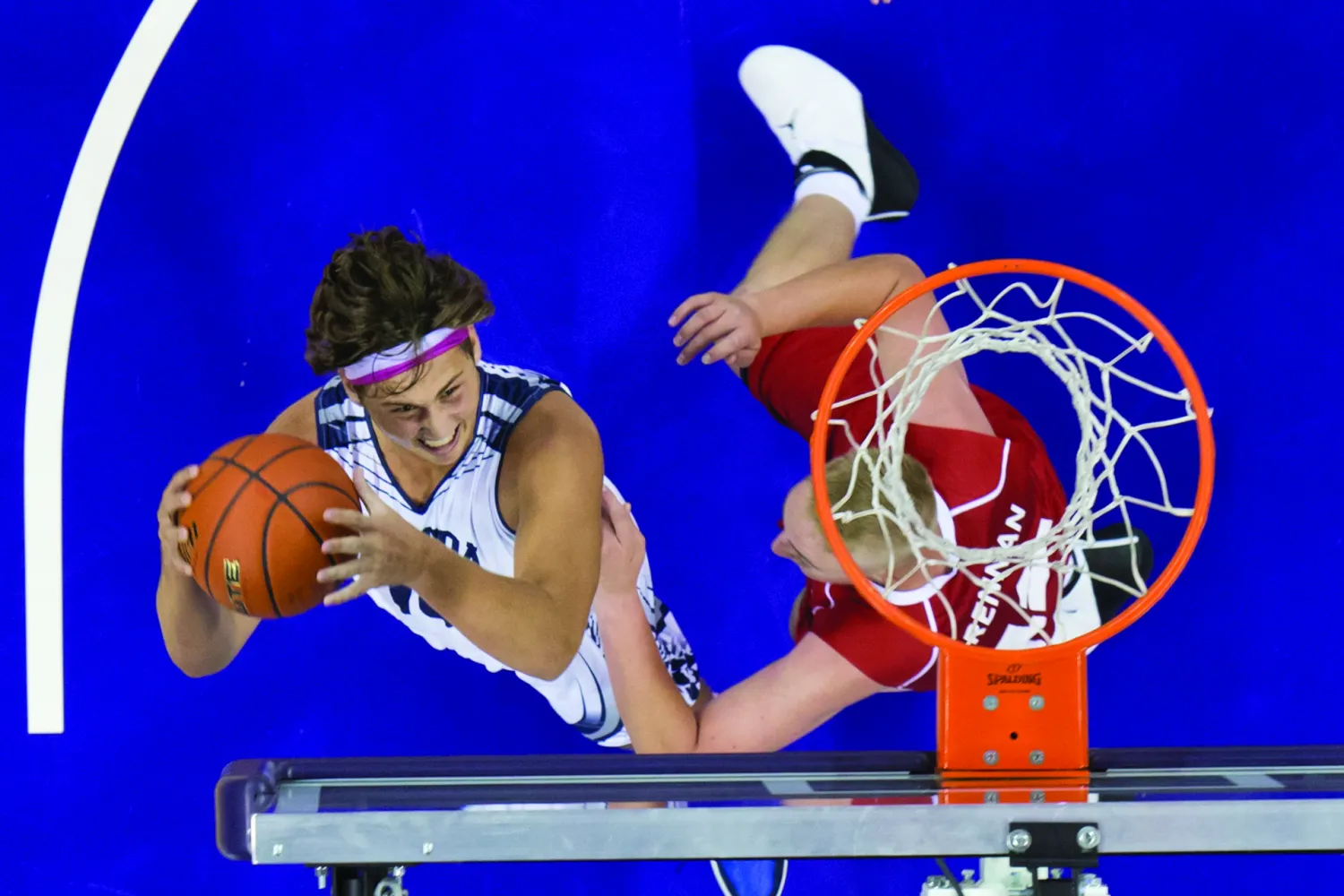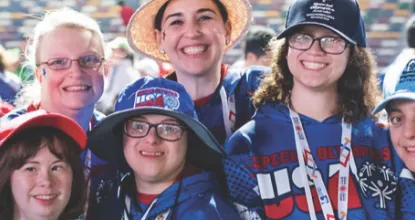
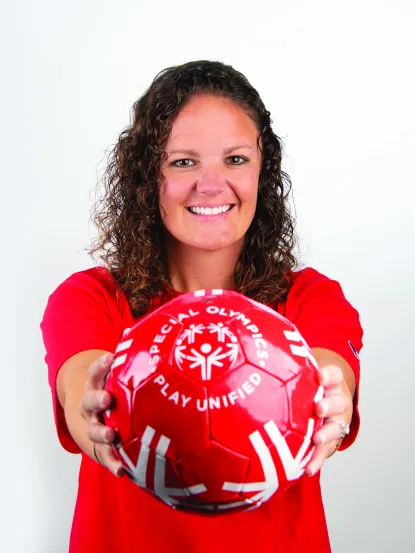
Tara Baker had fulfilled her goal of working for ESPN,
the dream job she once wrote about for a high school English class assignment. But about a decade into her employment, while serving on the production team for the sports network’s first nationally televised Special Olympics competition, she had a self-described “aha” moment that launched her career in a different direction.
“That experience got me thinking that maybe I could take what I learned at NMU and applied at ESPN, but do something for the greater good and work in a more meaningful capacity for a nonprofit,” said Baker ’05 BS. “My stepbrother, who came into my
life when I was in high school, is a Special Olympics athlete. I started as a spectator supporting him. All it took was one swim meet to see the immense joy on the athletes’ faces. After that, I volunteered whenever I could. I developed a real affinity toward people with intellectual disabilities and felt a strong desire to give back.”
Baker applied to be the director of marketing and communications for Special Olympics, despite knowing that the responsibilities extended beyond her credentials. She said the organization “took a chance” in hiring her, and she quickly expanded on her video storytelling skills with on-the-job learning in website design, social media, PR and crisis management.
Special Olympics entrusts Baker to coordinate communications, marketing and partnership teams throughout North America, and to set and manage their strategic direction. She also oversees external and internal communications, and serves as the media liaison for major events.
Baker was well- aware of Special Olympics’ mission to empower individuals with intellectual disabilities to become physically fit, productive and respected members of society through sports training and competition.
She said it was not until after securing her position that she fully realized its scale and scope. Special Olympics has a presence in 290 countries and serves 6 million athletes. In North America, more than 500,000 athletes from the United States, Canada and the Caribbean participate in 32 sports.
“It’s rewarding to know that every second I put into this, I’m impacting millions of people’s lives for the better,” Baker said. “I could work on a one minute piece of content for ESPN all week long that may or may not run, be viewed or move someone. It’s hard to get creative when you’re covering the same athletes and teams over and over. Special Olympics is a treasure trove of inspiring content, from athletes overcoming obstacles to parents who’ve adopted children with disabilities to volunteers who devote their time and talents. It’s a pleasure to share these stories. No matter what I put into this job, I get so much more back.”
One notable story that recently caught Baker’s attention revolved around Special Olympics athlete Chris Nikic of Florida. In November 2020, he became the first person with Down syndrome to complete an Ironman triathlon, a feat verified by Guinness World Records. The eventconsists of a 2.4 mile swim, a 112-mile bike ride and a 26.2 mile marathon. Baker said doctors and other authorities had told Nikic he wouldn’t be able to physically compete at anywhere near that level, but he adopted the mantra of getting better 1% at a time.
“He is one of the best ambassadors for spreading the message of inclusion, and what people with disabilities can accomplish, given the right tools and support,”
she said.
Nikic also conquered the Boston Marathon in October. He will compete at the 2022 Special Olympics USA Games June 5-12 in Orlando, an event Baker began preparing for three years ago. She oversees the Orlando organizing committee’s marketing and communication efforts. She will also support global broadcast partner ESPN’s production of the event. Baker said it creates “perfect synergy” with her former job, which she left on good terms.
In August 2022, Detroit will host men’s and women’s soccer/football teams from up to 31 nations for the Unified Cup, a competition held every four years. Baker’s role is to serve as a liaison between Special Olympics Michigan and global headquarters in Washington, D.C.
Her enviable positions with ESPN and Special Olympics have allowed Baker to combine personal passion—she was a three-sport-a-year athlete in her hometown of Wauconda, Illinois—with her strengths in “writing, talking a lot and creating home movies growing up.” Her original goal was to become an ESPN SportsCenter anchor, but Baker’s Northern experience convinced her that she would rather work behind the scenes in production than in front of the camera.
Baker selected Northern based partly on previous family visits to the Upper Peninsula, where her paternal grandparents were born and raised. She also wanted to attend a school that had an electronic journalism program, was out of state within a six-hour radius of her hometown, and offered her the potential to become a walk-on soccer player. She not only succeeded at the latter, but went on to serve as team captain her sophomore and junior years and received the most valuable defense award after her sophomore season.
The knowledge Baker gleaned in the classroom and the skills learned through practical experience at NMU proved pivotal to her future. She said the smaller class sizes allowed for one-on-one attention, and professors like Dwight Brady and the late Chuck Ganzert gave students the tools, resources and direction they needed.
“I was using cameras my freshman year and Final Cut Pro editing software as a sophomore. Participating in the student-run Public Eye News show on the campus PBS affiliate was extremely valuable, as was helping with televised broadcasts of NMU athletic events. I also had internships at local radio and television stations. All of that provided me with more hands-on experience coming out of college than most of the people I was up against for jobs; even those from bigger, well-known broadcasting programs.”
Baker’s preparation was certainly valuable, but serendipity also intervened to open a door at ESPN. She decided to enroll in an extra course in field production in the final semester of her senior year. The class was working on a documentary about the UP 200 sled dog race. It turned out an ESPN production company, Red Line Films, was in Marquette for the same purpose. Networking opportunities surfaced and Baker provided her contact information, but it wasn’t until July that she heard anything. The company invited her to interview in New York City and offered her a production associate job on the spot.
Baker worked for Red Line out of ESPN headquarters in Bristol, Connecticut About a year later, in 2006, she shifted to ESPN Classic as a production assistant. The role involved coordinating interviews and writing scripts, obtaining footage, and adding music and graphics to programs. When ESPN decided to cancel Classic’s original programming, she was reassigned to live event and game coverage as a production assistant.
Over the next decade, Baker’s titles and responsibilities escalated. She became an associate producer who developed, shot, scripted, and edited high-end elements such as teases and features. Then she worked her way up to post producer, managing creative content for ESPN’s premier properties such as NCAA football and basketball, Grand Slam tennis, World Cup and Euro soccer tournaments, MLB, NBA, X Games and more.
The 2010 FIFA World Cup in South Africa was significant for a couple of reasons. It was there that Baker met fellow ESPN employee Jean-Luc LaDouceur, who later became her husband. She also said the event was a major highlight of her time at the network because she got to produce a piece that aired just before the final game. Baker said ESPN’s coverage also transformed the way soccer was viewed in America and gained many fans.
“Another amazing opportunity was working on the Australian and U.S. Opens in tennis because I got to travel to Australia four times and we were given the freedom to take chances creatively. I oversaw content for the women’s NCAA national basketball championship and the tourney leading up to it. That gave me a growing managerial role and allowed me to elevate the women’s coverage to make it look just as good as the men’s. I was also lucky to work on the college football playoffs and national championship for a number of years before I left ESPN.”
While grateful for the experience to ascend the production ranks at ESPN, Baker has no regrets about seeking the coveted position with Special Olympics. She is skilled at telling others’ inspirational stories, but hers is also impressive and worth sharing. After all, Baker has achieved something that eludes most people: the chance to land not one, but two dream jobs. The second was unscripted right up until her “aha” moment, but she said it is proving to be immensely rewarding and meaningful.
by Kristi Evans
